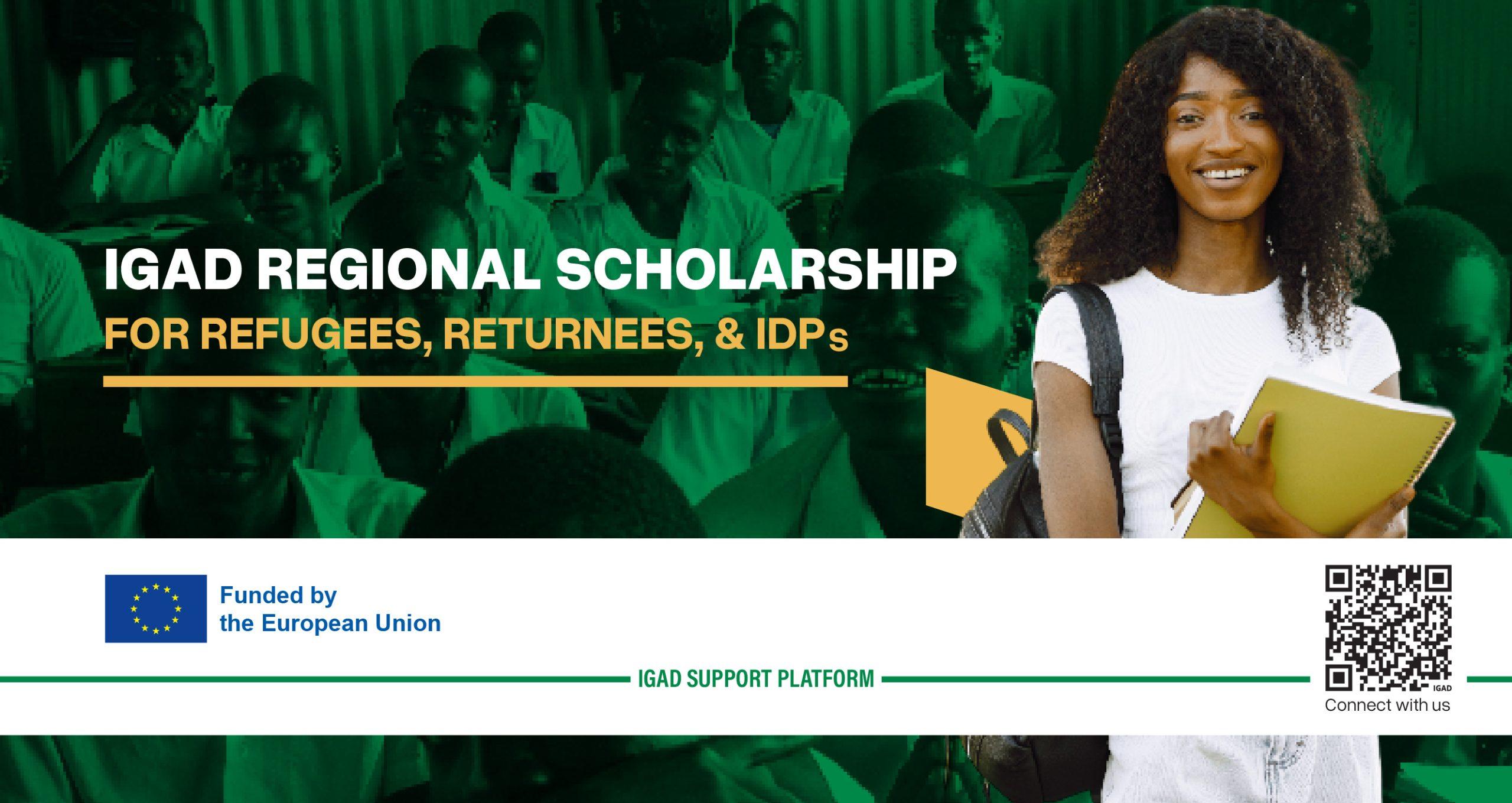I. INTRODUCTION
This Guideline serves as a reference document for the Coordination Unit of the IGAD Support Platform and stakeholders involved in the IGAD Regional Scholarship Program. The Coordination Unit, established through the EUTF-CRRF grant, oversees the program’s implementation, including monitoring, supervision, and reporting. This document outlines all aspects of the scholarship program, including eligibility criteria, selection process, financial management, reporting, and program monitoring.
2.0 OVERVIEW OF THE IGAD REGIONAL SCHOLARSHIP PROGRAM FOR REFUGEES, RETURNEES, IDPS, AND THEIR HOST COMMUNITIES
2.1 Background
In 2021, UNHCR estimated over 14 million individuals of concern in the IGAD region, including refugees, returnees, stateless people, internally displaced persons (IDPs), and asylum-seekers. This represents over 70 percent of all displaced populations in Africa and over 20 percent globally.
The IGAD Regional Scholarship Program for Refugees, Returnees, IDPs and their Host Communities is an integral part of the Djibouti Declaration on Education for Refugees, Returnees and Host Communities adopted by the IGAD Ministers of Education in December 2017. The Scholarship is anchored on a decision of the IGAD Heads of State and Government Summit of March 2017, the Comprehensive Refugee Response Framework (CRRF) Agenda 2063, the SDGs, and the Global Compact on Refugees.
Refugee, Returnee, and IDP youth face many barriers to higher education. The IGAD Regional Scholarship Program was established to provide youth with greater access to higher education, as well as to enhance their training and skill development. The Program offers a range of opportunities to IGAD Scholars, including access to Technical and Vocational Education and Training (TVET) institutions, undergraduate and graduate studies, internships, mentorship, networking events, and additional leadership training activities in their host or home countries.
The IGAD Regional Scholarship Program is a flagship initiative of the IGAD Executive Secretary. The Program will provide financial assistance to 35 students admitted or enrolled in an accredited institution of higher education in their host community or place of origin. The Program aims to produce future leaders who can promote self-reliance and regional integration by providing them with quality education and training.
2.2 Goal and Expected Outcomes
The program’s primary objective is to enhance the economic inclusion and livelihood opportunities of refugees, IDPs, returnees, and host communities, fostering their self-reliance. It seeks to support students in completing their post-secondary education, equipping them with relevant skills and promoting inclusive access to quality higher education.
The Scholarship program aims to:
- Identify and support academically talented refugee, returnee, and IDP youth pursuing higher education within the IGAD region.
- Develop a pool of skilled young leaders and graduates equipped with the necessary skills to participate in livelihoods and economic opportunities.
- Address gender and other disparities in refugees’, returnees’, and IDPs’ access to higher education in the IGAD region, particularly focusing on women and marginalized groups.
- Promote sustained investment in the education and advancement of refugee, returnee, and IDP youth and their host communities.
2.3 Objectives
The program aims to provide financial assistance to post-secondary students, foster self-reliance, promote regional integration, and establish academic collaborations within the IGAD region.
3.0 THE PROCESS AND PROCEDURES FOR THE SELECTION OF IGAD REGIONAL SCHOLARSHIP PROGRAM STUDENTS
3.1 Eligibility Criteria
To be eligible for the Scholarship, applicants must:
- Belong to a displacement-affected community (refugees, returnees, IDPs) with formal documentation.
- Be citizens of an IGAD member state, including those in refugee /displacement situations.
- Be admitted or enrolled in an accredited institution in the IGAD region.
- Demonstrate financial need.
- Prioritization of women, persons with disabilities, and other disadvantaged populations, with at least 30% of scholarships reserved for female students. Special consideration will be given to applicants from Somalia and South Sudan, representing the largest long-standing displaced populations in the region.
3.2 Selection Process
The IGAD Council of Higher Education (ICHE) oversees beneficiary selection, ensuring enrollment at institutions within host countries.
3.3 Selection Criteria
In the interests of equity for all students and accountability in relation to the selection process, IGAD will adhere to the following selection criteria:
- Demonstrated excellent academic performance throughout primary and secondary education.
- Enrollment in, or acceptance to, an accredited public or private educational institution in IGAD.
- The field of study must be relevant to the market needs in the student’s home country.
In addition, the following issues will be determined during the interviews with the potential / shortlisted candidates:
- Demonstrating thoughtful and coherent educational and career goals.
- Extra-curricular interests and achievements.
- Potential to achieve goals and likelihood to succeed in the proposed academic environment.
- For post-graduate studies, applicants must have at least one year of work experience in relevant fields, either institutional or self-employment.
3.4 Duration
The duration of the IGAD Scholarship is 3 to 4 years.
3.5 Program Coverage
- The Program will cover the financial costs of training (tuition, accommodation, subsistence, and medical cover) up to a maximum of Euros 3,189 per student per year.
- The exact amount of financial support will be determined based on the costs of training and living expenses.
The Scholarship does not cover the following:
- Extra support for family members/dependents, including children and spouses.
- Application costs to partner institutions, including certifying and equating certificates.
3.6 Monitoring and Evaluation Systems
ICHE monitors beneficiary performance, reviews program performance, and conducts bi-annual scholarship review meetings. Scholarship awardees submit mid and end-of-year narrative reports tracking their progress.
